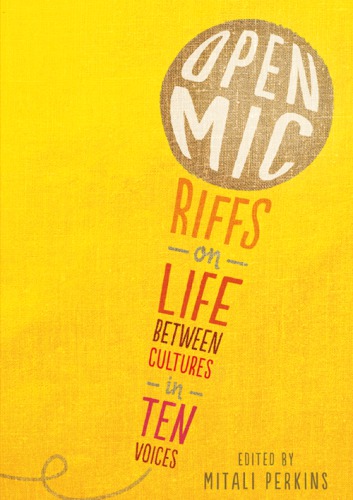
Open Mic
Riffs on Life Between Cultures in Ten Voices
فرمت کتاب
ebook
تاریخ انتشار
2013
Lexile Score
810
Reading Level
3-4
ATOS
5
Interest Level
9-12(UG)
نویسنده
G. Neriناشر
Candlewick Pressشابک
9780763667191
کتاب های مرتبط
- اطلاعات
- نقد و بررسی
- دیدگاه کاربران
نقد و بررسی

July 29, 2013
Ten writers and artists, including Varian Johnson, Naomi Shihab Nye, and Francisco X. Stork, offer brief works of fiction and nonfiction “about the between-cultures life.” As Perkins notes, “Humor has the power to break down barriers and draw us together across borders,” and the stories within bear that out, though few qualify as laugh-out-loud funny. Most offer a subtler, uncomfortable brand of situational humor: Olugbemisola Rhuday-Perkovich calls her high school “an oasis of suburban racial integration”; when the drama club performed The Crucible, “the drama coach was sensitive enough to ask the black members of the troupe if we’d be uncomfortable playing the role of slave Tituba.” And in “Under Berlin,” written in verse, G. Neri describes a “game” that a biracial American family plays on the German subway: seeing how quickly two elderly white women will change seats after the black father sits between them. The edgy joke-flirting between a Jewish violinist and Asian comedian in Cherry Cheva’s “Talent Show” and the hero of David Yoo’s “Becoming Henry Lee,” who comically embraces Asian stereotypes in an effort to fit in, will leave readers thinking about the ways that humor can be a survival tool in a world that tends to put people in boxes. Ages 12–up.

September 1, 2013
Gr 6-10-More likely to be used with teens pedagogically than recreationally, this collection of short tales in a variety of genres explores the experiences of young people bridging cultures. Perkins's contribution is a memoir about the Guy Game she and her two older sisters played in their secret pursuit of points earned by being asked out, complimented, or kissed by boys. She tells about when a boy the color of deli turkey takes this chocolate-hued Indian girl on a church trip to an amusement park for a memorable three-point experience. Other highlights include Gene Yang's comic about why he boycotted a Hollywood version of the Avatar narratives that celebrate Asian culture in other formats but cast only white actors in this incarnation. A poem tells a wryly humorous story of unsettling white Berliners with a biracial family while another story focuses on a Korean kid who eschews Asian stereotypes until it becomes expedient to experiment with a reputation for math and martial-arts skills for a rung or two on the social ladder. Teachers will find some powerful material here about how the young can become discomfited and find solace in their multifaceted cultural communities. Francisco X. Stork relates unexpected acceptance and support for a gay Latino teen, while in other selections, characters proudly wave a Black Geek flag or grieve the loss of an Arab father who reached out with both hands to overcome prejudices. Purchase where schools seek useful pieces about YAs who identify with multiple cultures.-Suzanne Gordon, Lanier High School, Sugar Hill, GA
Copyright 2013 School Library Journal, LLC Used with permission.

August 15, 2013
First the good news: Half the pieces in this uneven anthology are standouts. The Korean-American teen in David Yoo's story makes an unwanted, undeserved Asian "model minority" label work for him, acquiring unexpected life skills in the process. The sole black student at a Vermont boarding school is unsettled when black twin sisters also enroll in Varian Johnson's nuanced tale. Gene Luen Yang's graphic anecdote demonstrates how standing up for one's beliefs can yield rewards beyond self-esteem. Luis' siblings give him permission and support to transcend cultural constraints and be himself in Francisco X. Stork's gentle tale. Naomi Shihab Nye's wistful, bittersweet poem "Lexicon" looks at the power of words to unite or separate, exemplified by her Palestinian father and his fading hopes for peace. The remaining pieces are significantly weaker. Perkins salutes the value of lightening up in her introduction: "Conversations about race can be so serious, right? People get all tense or touchy." She offers ground rules: Good humor pokes fun at the powerful, not the weak; builds affection for the "other"; and is usually self-deprecatory. Yet too few pieces here reflect those rules or appear to have been conceived as humor. Undisclosed selection criteria, author bios that don't always speak to identity, and weak and dated content are problematic. The sweeping racial and cultural judgments and hostile--occasionally mean-spirited--tones of several pieces disappoint; angry venting may be justified and therapeutic, but it's seldom funny. Leaves readers with more questions than answers. (Anthology. 12 & up)
COPYRIGHT(2013) Kirkus Reviews, ALL RIGHTS RESERVED.

September 1, 2013
Grades 5-8 In this anthology that blends fiction and nonfiction, Indian American editor Perkins has assembled 10 original selections about race that have in common a humorous take on an often serious subject. Humor has the power to break down barriers and draw us together across borders, Perkins writes in her introduction. Aside from their humor, these border-breaking stories all share a viewpoint from within the culture that provides the setting and subject. The stories are varied in format: twoby G. Neri and Naomi Shihab Nyeare stories in verse, while a third, by Printz Awardwinner Gene Luen Yang, is in the format of a graphic novel. Several of the stories come perilously close to being didactic, but all are, in their respective ways, enlightening. As for humor, David Yoo's excellent Becoming Henry Lee is the one that will probably elicit the most laughs. But all invite sometimes rueful smiles or chuckles of recognition. And all demonstrate that in the specific we find the universal, and that borders are meant to be breached.(Reprinted with permission of Booklist, copyright 2013, American Library Association.)

























دیدگاه کاربران